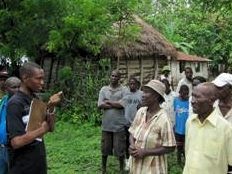|
||||||||||||||||||
|
|
Haiti - Social : Integrated community development program in Les Cayes 05/08/2011 14:36:06
This program of 3 years covers 11 parishes and five municipalities. 800 families benefit [about 5,000 individuals]. Its objective is to contribute to the improvement of the agro-ecological, health and socio-economic conditions of the population by supporting them in a process of appropriation of the various development activities within the communities. It is implemented by the Haitian Christian Community Development (DCCH), an essential actor of development in the South especially in the area of Les Cayes. In 2000 the DCCH has become a sector of the Caritas South. The agricultural component, focuses on the themes of sustainable development and food security. The goal is to improve the conditions and technical knowledge of families to increase their economic potential, to secure and diversify their diet. This is to enhance the productive capacity of land, while fighting against deforestation and erosion in the intervention areas, through agricultural and ecological techniques. Agronomists and agricultural technicians, travel regularly within the communes, in order to transmit to the beneficiaries, through practical training the manufacturing techniques of composting, green manure or even of sorting waste. The technique of development of nurseries for the reforestation of watersheds is also transmitted to the rural families, by providing them seedlings of fruit and forest trees such as mango, acacia or cedar. A technique for improvement of the livestock, goats and cattle, is also part of the program. An animal male of "improved race" is purchased for the fertilization of five females. It is important to note the good re-appropriation of these techniques by the farmers, which is essential to the sustainability and to the development of these practices over time. The health component for its part, has for priority to allow local access to care for the populations concerned, which in addition to being very poor, are also geographically isolated. Mobile clinics visits the communes every month. 12 dispensaries spread over the area, also provide access to care. The program has four main axes :
The populations pay 100 gourds for a consultation that includes analysis and vaccines that are made as well as the drugs prescription. On the other hand, on the sidelines this program mothers' clubs exist to strengthen the bonds of solidarity and mutual assistance among the beneficiaries, especially among women. hese clubs are both a places of exchange, on the education of children and also help educate mothers about malnutrition, diseases such as HIV or the cholera. These places also allow to develop the micro-savings and micro-credit. Indeed, to join the club, these women give a nominal fee each month, about 100 gourds, hich is the "green box". These funds are placed, and once a year, interests are distributed to each of them. The mothers may also thanks to the "red box" contracting small loans to develop a micro-business or to pay school fees, they repay loans after six months. Finally, some of this money can be used to create a common economic activity [sale of food or craft] and the benefits are then shared. HL/ HaitiLibre
|
|
|
Why HaitiLibre ? |
Contact us |
Français
Copyright © 2010 - 2024 Haitilibre.com |



